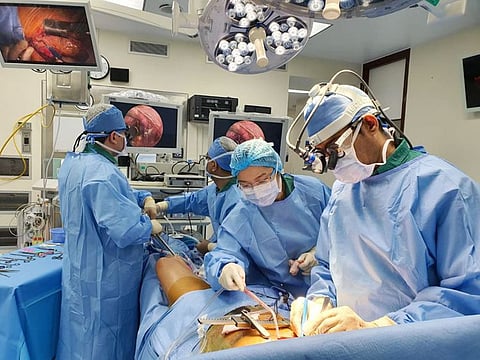Dubai surgeons save life of 36-year-old man after complex, eight-hour surgery
All vital organs such as brain, intestines, kidneys and heart had to be reperfused

Dubai: After a gruelling eight-hour surgery conducted by Dubai Health Authority (DHA) doctors at Dubai Hospital, the life of a 36-year-old Gulf Cooperation Council national who had suffered a dissected aorta, was saved in the nick of time.
During the patient’s aorta replacement, blood was reperfused to the other arteries in the brain, intestines, kidneys and heart.
Recounting the incident of December 31, Dr Ayman Majzoub, Emergency Medicine specialist at Rashid Hospital, said that the patient was attending a New Year’s Eve event when he felt sudden chest pain. He was admitted to the DHA’s field hospital that was especially erected to address any medical emergencies during New Year’s Eve. Subsequently, the patient was rushed to Rashid Hospital’s Trauma and Emergency Centre. After all the necessary examinations, accurate diagnosis and stabilisation, the patient was transferred to the Department of Cardiothoracic Surgery at Dubai Hospital.
Need for urgent medical intervention
Dr Majoub added that the patient’s condition required urgent medical intervention to save his life. The tests, including CT scans, confirmed the presence of a dissected aorta and the need for immediate surgical intervention. “In a majority of such cases, the patient dies before reaching the hospital or within 24 hours of reaching the hospital,” explained Dr Majoub. He also said that the doctors in the Emergency section collaborated closely with the doctors from various other departments at the hospitals and other DHA hospitals to provide the highest quality of multidisciplinary care and treatment.
Dr Obaid Al Jassim, consultant and head of the Cardiothoracic Surgery Department at Dubai Hospital, said that the medical team immediately conducted all the necessary tests and extensive preparations were made prior to such a complex procedure.
Complicated surgery
He said the surgery was particularly complex as the patient had a dissected aorta, which means blood supply was affected to all the major organs of the body. During the eight-hour surgery, doctors replaced the affected aortic valve and the main part of the aorta and conducted re-implantation of the coronary arteries and arteries of the brain.
Dr Al Jassim said: “We first put the patient on a heart-lung machine, which is a device used in open-heart surgeries to support the body’s circulation and oxygenation during the surgical procedure, as the heart is stopped. We then lowered the body temperature to 18 degrees Celsius to protect the patient’s brain and we did some procedures to ensure the brain received oxygenated blood during the surgery.”
Six-monthly follow-ups
He said the patient was kept in Intensive Care Unit for 48 hours post-surgery, after which the doctors removed his ventilator and he was moved to the recovery room. He will require six-monthly follow-ups, in addition to maintaining a healthy lifestyle and managing his blood pressure and blood sugar levels. Dr Al Jassim said that in cases such as this, the probability of death increases by 5 per cent every hour unless there is urgent medical intervention.
A multidisciplinary team led by Dr Al Jassim performed the surgery. The team included Dr Mustafa Fawzi Mustafa, senior specialist and cardiothoracic surgeon, Dr Tariq Abdul Aziz, senior cardiothoracic surgeon, and Dr Muhannad Al Asaad, cardiothoracic surgeon. A team of consultant anaesthesiologists included Dr Yahya Qarali and Dr Muhammad Fayyad.
Sign up for the Daily Briefing
Get the latest news and updates straight to your inbox



